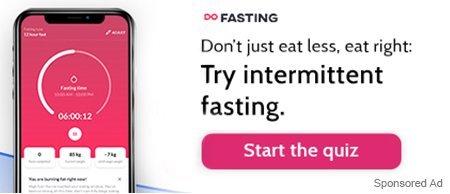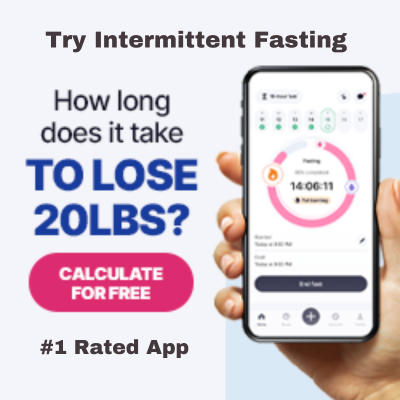5 reasons why Intermittent Fasting Doesn’t Work | 3 Tips to be successful at Intermittent Fasting
So, you have given Intermittent Fasting a try. Or maybe you have given it several tries. And you still aren’t seeing results. It can be frustrating and hard to understand why Intermittent Fasting is working for other people and not for you. What is happening when intermittent fasting doesn’t work?
Whether it’s a plateau in weight loss, not sticking to your eating and fasting windows, or just feeling like you have no energy while Intermittent Fasting, you may be thinking “when should I give up on Intermittent Fasting?” Before you completely ditch Intermittent Fasting for good, keep reading for the most common problems (and solutions!) that we have seen.
What happens when Intermittent Fasting doesn’t work? In this article, we will explore some common mistakes people make while Intermittent Fasting that would lead to little or no results. We’ll also discuss some potential solutions to these common problems that may finally put you on the right track to seeing results with Intermittent Fasting.

Before we dive into some of the common mistakes people make while Intermittent Fasting, let’s go over some basics to make sure that we are all on the same page. While there isn’t a one-size-fits all weight loss or health strategy, Intermittent Fasting has helped millions of people lose weight and achieve their health goals.
You can think of Intermittent Fasting as more of a diet schedule than a diet that tells you exactly what to eat. For some, this takes the pressure off of knowing what foods to eat and instead, focuses on a specific window of time that you eat and a specific window of time where you don’t eat (fast).
The idea is that through calorie restriction and reducing the number of meals that you eat, you will see weight loss and improvement in things like insulin sensitivity.
One golden rule of Intermittent Fasting is to CONSISTENTLY keep your eating and fasting windows. There are many types of Intermittent Fasting schedules and it’s important to choose the schedule that works best for your lifestyle.
For example, if you are following 16/8 Intermittent Fasting, you would want to choose your 8-hour eating window to be at a time when you are most active. For many that follow this type of Intermittent Fasting, your eating window may be 9AM to 5PM if you like eating earlier in the day. For others that may typically skip breakfast, your eating window may be best between 12PM to 8PM.
Whichever type of Intermittent Fasting you choose, there can be some mistakes or pitfalls along the way. It’s totally normal to have some plateaus in progress, but if you are consistently not seeing results, one of these common mistakes may be the culprit.

When Intermittent Fasting Doesn’t Work: 5 Reasons & Solutions
Here are some common mistakes while Intermittent Fasting and some potential solutions to try.
Eating too many calories
This is one of the top reasons why some don’t lose weight when they start Intermittent Fasting. While the idea is that by reducing the amount of time that you have to eat meals, you will essentially reduce your overall calorie intake. However, you can certainly consume too many calories than necessary for your energy needs during your eating window.
The bottom line is that if you are eating too many calories, those unused calories will be stored as fat. That’s why it’s important to be aware of what you are eating, even though there isn’t a strict rule for what you can and cannot eat while Intermittent Fasting.
Solution: Try tracking or writing down what you are eating for a few days. Trackers such as My Fitness Pal can be a helpful tool to figure out exactly how many calories you are eating at each meal. It’s best to aim for around 300-500 calories per meal to stay within the average range. If you are unsure how many calories you should be eating, consult with a dietitian.
Skipping meals during your eating window.
This can be a problem, especially if you are dealing with a lot of fatigue while Intermittent Fasting. Your eating window should be a timeframe when you are consistently eating in order to achieve calorie balance with your energy needs. If you skip meals during your eating window, you may not be consuming enough calories, even if your goal is weight loss. We all need a baseline amount of calories in order to carry out our day to day tasks, and constant fatigue may be a sign you are not eating enough calories.
Solution: If you find yourself constantly skipping meals, then you may need to adjust your eating and fasting windows. If you know that your mornings are really busy and most of the time you’re skipping breakfast, try pushing your eating windows forward to start at 12PM.
Then, you will have more time at night to get in one more meal and keep your calories within range. Especially in the beginning, try sticking to set meal and snack times until it becomes more of a habit. It’s also important to eat until you are full. Listening to when your body is full is key to finding the right balance.
Not fasting long enough.
If you aren’t fasting for 10 hours or more, you may not see results. Having a long stretch of hours or even days of fasting allows your body to rest and start using up stored fat. It also helps your body burn more fat to fast for at least 12 hours.
If you are eating a night time snack around 10PM and then waking up and eating breakfast at 7AM, you haven’t given your body a long enough fast. Similarly, if you are fasting and then eat in the middle of your fast, you are breaking your fast and the hours won’t be long enough.
Solution: Try starting off with a shorter fasting type of Intermittent Fasting such as a 14/10 or a 16/8. For most people, it’s a natural timeframe for fasting and works with your circadian clock. Set limits on late night snacking to ensure you have a complete 14 or 16 hour fast. Stick with one pattern for at least 21 days so your body has time to adjust to this new routine.
Not eating the right kinds of foods.
Many people think that because there are no set rules on what to eat, that you can eat anything you want while Intermittent Fasting. This is not at all the goal of Intermittent Fasting and a healthy diet full of nutrient-dense foods is encouraged.
You may unknowingly be eating higher calorie or high fat foods simply out of habit or based on what everyone around you is eating. You won’t see many of the benefits of Intermittent Fasting if you aren’t eating the right kinds of foods.

Solution: Aim for 1-2 servings of fruits and vegetables at each meal to start. If you focus on adding more nutrient dense foods into your diet, you won’t have as many cravings for higher fat or sugary foods. It’s also essential to eat enough protein.
Incorporating lean protein such as chicken or fish can help keep you fuller longer and keep other cravings at bay. You likely don’t need to completely overhaul your diet, but making small changes here and there can really go a long way to seeing the benefits that Intermittent Fasting can provide.
Not planning ahead
Having a plan is important for any type of health or fitness routine, and especially important while Intermittent Fasting. Since you are eating during a shorter period of time, you have to be prepared with what meals and snacks you are going to eat and when you are going to eat them.
If you find yourself always “winging it” when it comes to meals and snacks, then you may feel stressed when it’s almost time for your fasting window and you still haven’t had your last meal of the day.
Solution when intermittent fasting doesn’t work: A little planning goes a long way in this instance. Try planning out your meals and snacks for the next few days. This will ensure that you have the right ingredients on hand and there won’t be any last minute grocery trips to buy the one item that you forgot. You will probably feel a lot less stressed about not having to make any last minute decisions and it will be easier to stick with your eating and fasting windows.

Tips to be successful at Intermittent Fasting
These are some of the common problems when Intermittent Fasting isn’t working out for someone. Of course, there may be other reasons Intermittent Fasting isn’t working out for you. Some general tips to be successful at Intermittent Fasting include:
Realize that it won’t be perfect
There are definitely going to be days where you don’t get your eating and fasting windows just right or you don’t eat completely nutritious meals. That’s okay! There will be some setbacks, but as long as you keep pushing for consistency, you are going to see results. (Read here for reasons why it can be beneficial to have a cheat day!)
Find the right schedule
Be realistic with your time and schedule to know what Intermittent Fasting type will work for you. Maybe a 5:2 schedule is more conducive to your usual habits and routines. It will be easier to stick with it if it aligns with your normal rhythms.

Adopt other healthy habits
Things like exercising, getting enough sleep, and stress management are also important factors to consider for an overall healthy lifestyle. Eating nutrient dense foods is one piece of the puzzle, so you may miss out on some great benefits if you don’t look at other factors that contribute to your health.
Conclusion – When Intermittent Fasting Doesn’t Work
I hope you’ve learned what happens when intermittent fasting doesn’t work. At the end of the day, there isn’t a one-size-fits all approach to nutrition and health. You are on your own wellness journey and have to do what is best for you and your goals. If you have tried Intermittent Fasting in the past and it didn’t work for you, we would encourage you to try using some of the tips and common mistakes to avoid in this article.
Related Articles You may like:
Want to know what you can Drink While Fasting? What Can You Drink during Fasting
Need an APP on your Mobile to help with Fasting? See our Top 6 FREE and Premium Fasting Apps
Want to know what weight loss results you can expect? Intermittent Fasting Results
Want to know which Fasting Schedule works best for you? Types of Intermittent Fasting












